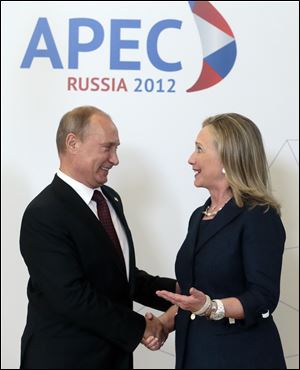
Russia rebuffs U.S. on Syrian sanctions
9/9/2012
Russian President Vladimir Putin and Hillary Clinton meet at the APEC meeting in Vladivostok.
VLADIVOSTOK, Russia -- Russia on Saturday soundly rejected U.S. calls for increased pressure on Syrian President Bashar Assad to relinquish power. U.S. Secretary of State Hillary Clinton tried to prod Moscow into supporting U.N. action to end the crisis in Syria, and she expressed hope that Congress would repeal Cold War-era trade restrictions on Russia.
Russian Foreign Minister Sergey Lavrov, after meeting Mrs. Clinton on the sidelines of a meeting of Pacific Rim leaders, said Moscow is opposed to U.S.-backed penalties against Assad and new ones against Iran over its nuclear program because they harmRussian commercial interests.
"Our American partners have a prevailing tendency to threaten and increase pressure, adopt ever more sanctions against Syria and against Iran," Mr. Lavrov said. "Russia is fundamentally against this, since for resolving problems you have to engage the countries you are having issues with and not isolate them."
"Unilateral U.S. sanctions against Syria and Iran increasingly take on an extraterritorial character, directly affecting the interests of Russian business, in particular banks," he said.
Mrs. Clinton, who also met with Russian President Vladimir Putin during the annual Asia-Pacific Economic Cooperation forum summit in Vladivostok, had urged Moscow to reconsider its opposition to the penalties, particularly against Syria in order to convince Assad that he should agree to a political transition, a senior U.S. official said.
Mrs. Clinton told her Russian counterpart that the Security Council needed to send "a strong message" to Assad, given the escalating violence in Syria, said the official, who was at the meeting. Mrs. Clinton made clear to Mr. Lavrov that the Security Council risks "abrogating its responsibility" if it fails to act.
The official spoke on condition of anonymity because the conversation was private.
Russia and China have blocked three Security Council resolutions that would have punished Syria if Assad did not accept a negotiated political transition.
Mrs. Clinton has called the actions appalling and said they put Russia and China on the "wrong side of history." Chinese Foreign Minister Yang Jiechi, however, said history would prove China's position to be correct. On Saturday, Mr. Lavrov said Russia's opposition to penalizing Syria was because "they don't achieve anything."
The question of sanctions against Syria and Iran will be a main topic of conversation among officials later this month at the U.N. General Assembly, and the U.S. official said Mrs. Clinton had discussed both with Mr. Putin.
Despite Russia's refusal to seek more pressure against Syria and Iran, Mrs. Clinton welcomed Russia's accession to the World Trade Organization last month and vowed Saturday that the United States soon would lift Cold-War-era trade sanctions. She added that the United States must normalize trade relations so that U.S. businesses can reap the benefits of Russia's membership, including lower tariffs for U.S. products.
Now that Russia has joined the World Trade Organization, Mrs. Clinton, who's in Russia's Far East representing President Obama at the APEC summit, said the Obama Administration is "working closely" with lawmakers on that issue and hopes that "Congress will pass on this important piece of legislation this month."
Although the sanctions in the 1974 law known as Jackson-Vanik are waived each year, they violate WTO rules, which could allow Russia to retaliate against U.S. businesses.
But the effort to grant Russia normal trade status has become entangled in legislation that would punish Russian officials accused of abusing human rights, denying them visas and freezing their assets. That has raised doubts that any deal on lifting the Jackson-Vanik provisions can be reached before the November election.
Officials did not address the human-rights legislation that has infuriated the Kremlin.
The human-rights bill, which has bipartisan support in both houses of Congress, is named after Sergei Magnitsky, a lawyer who died in prison in 2009 after being prosecuted on charges that his supporters argue were manufactured to cover up official corruption. If passed, the legislation would require sanctions on those considered responsible for Mr. Magnitsky's death and others who violate human rights.
Mr. Putin and other Russian officials have vehemently opposed the Magnitsky bill Congress is considering, warning of so-far-unspecified reciprocal measures if it is enacted into law.